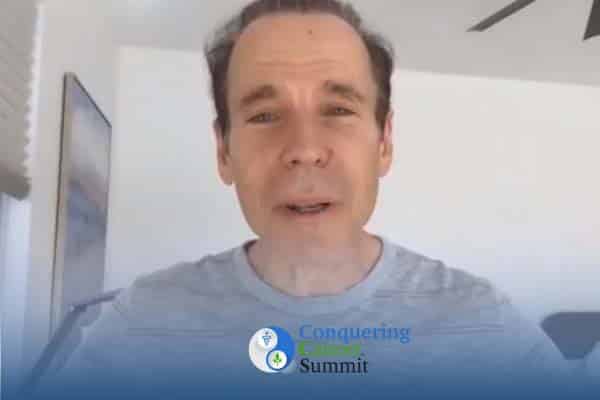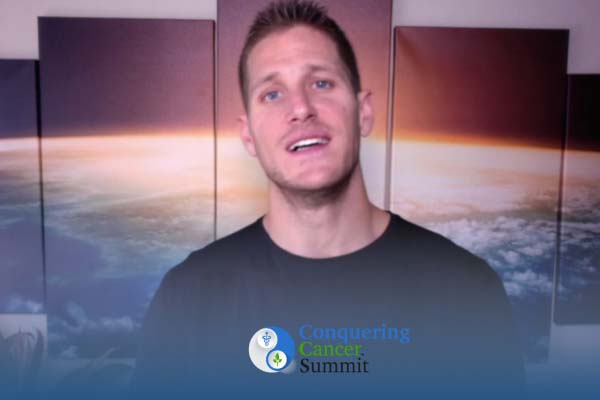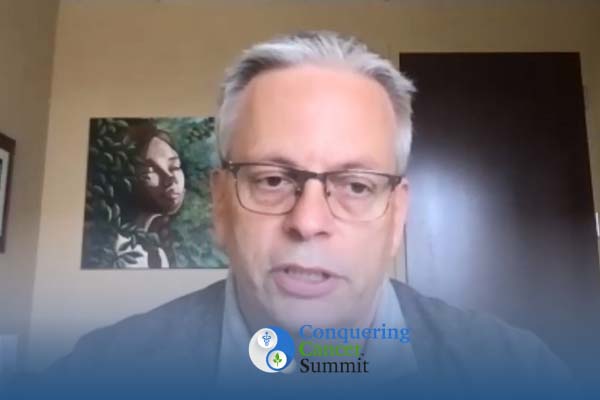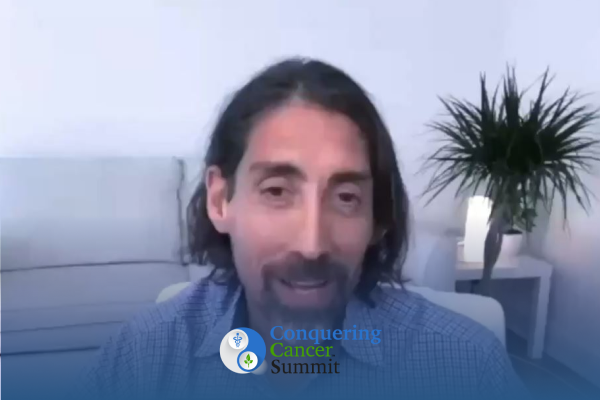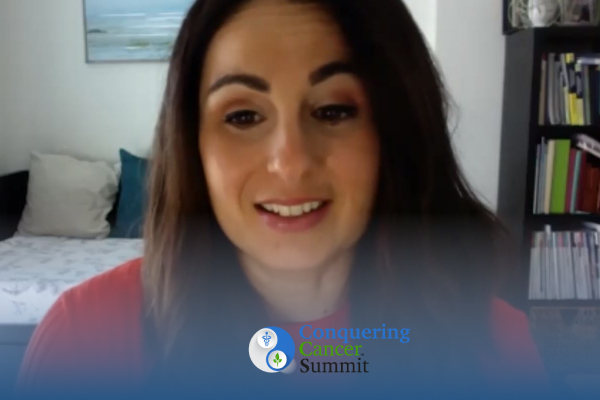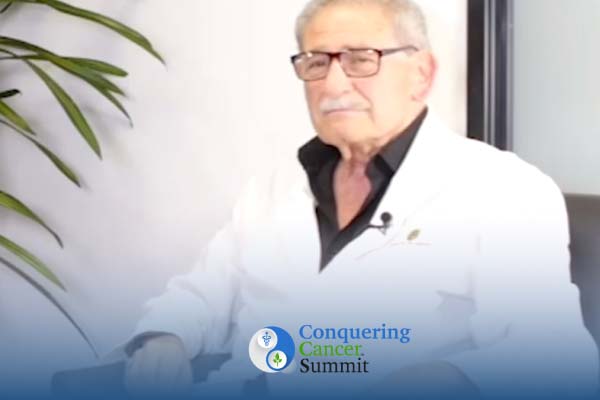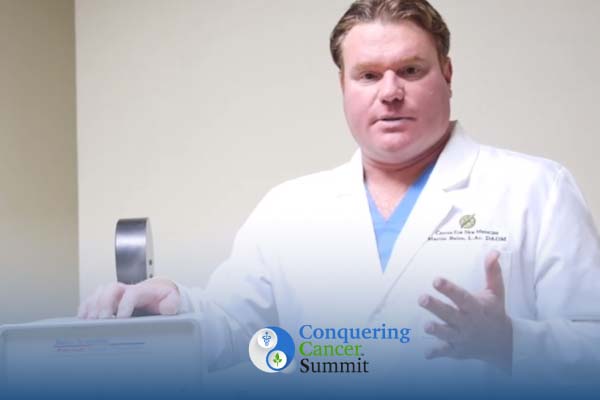Join the discussion below
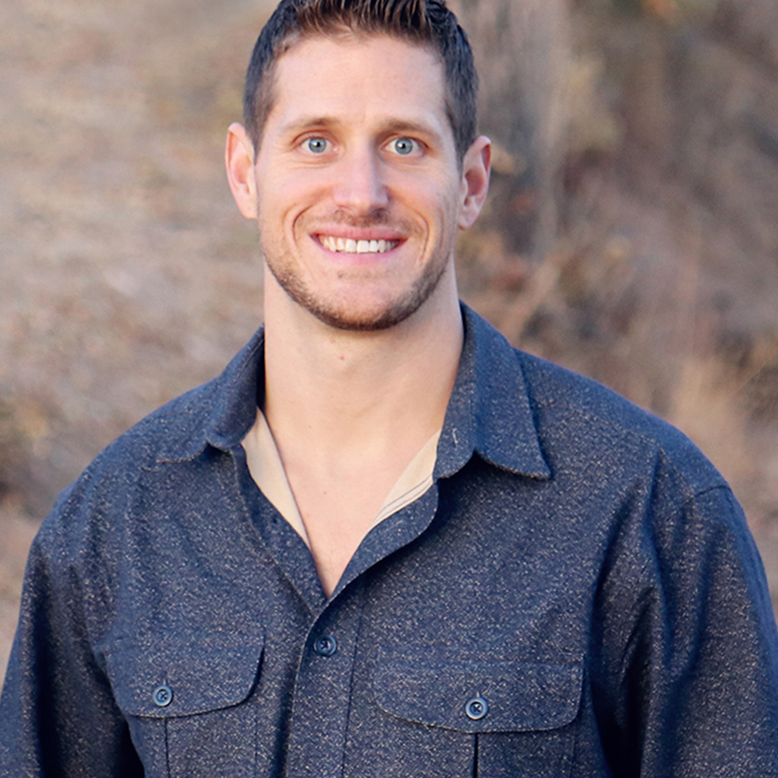
Nathan Crane is an award-winning author, inspirational speaker, plant-based athlete, event producer and 18x award-winning documentary filmmaker. Nathan is the Founder of The Panacea Community, Creator of the Global Cancer Symposium, and Director and Producer of the documentary film, Cancer; The Integrative Perspective. He is also the Director of Strategic... Read More
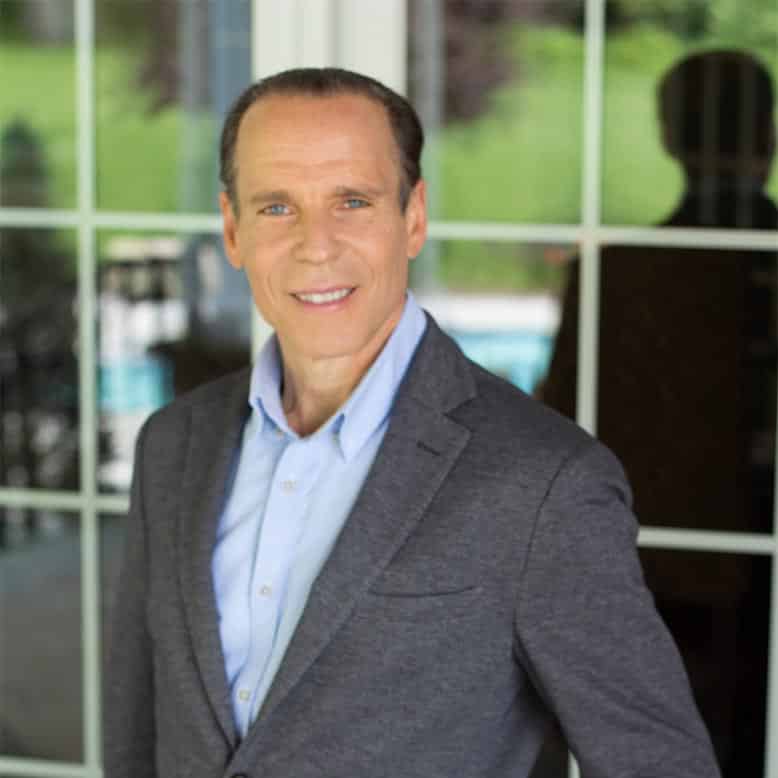
Joel Fuhrman, MD is a board-certified family physician and nutritional researcher who specializes in preventing and reversing disease through nutritional and natural methods. He is the president of the Nutritional Research Foundation and author of seven New York Times bestsellers: Eat For Life, Eat to Live, The End of Diabetes,... Read More
- The best diet for preventing and reversing cancer (even if you already have food restrictions or allergies)
- The truth about animal products and how they affect our health
- How much protein you need to prevent and reverse cancer
Related Topics
Acrylamides, Animal Products, Animal Protein, Anti-cancer Diet, Best Diet, Breast Cancer, Cancer, Cancer Prevention, Carcinogenic Compounds, Carcinogenic Substances, Cellular Replication In Cancer, Chronic Diseases, Colon Cancer, Decreased Protein, Excess Calories, Fat Storage, Growth-promoting Foods, High Glycemic Load, Hormonal Favorability, Hormonally Favorable Diet, Ideal Igf-1 Range, Igf-1, Igf-1 Levels, Immune System, Longevity, Nutrition, Obesity, Prostate Cancer, Protein Bioavailability, Rancid Compounds, Remission, Science-backed Diet, Seventh Day Adventist Health Study-2, Standard American Diet, Worst DietNathan Crane
Hey it’s Nathan Crane, Director of the Health and Healing Club and Host of the Conquering Cancer Summit and today I am honored and excited to welcome you to a very special interview. Dr. Joel Fuhrman is MD, Medical Doctor. He’s a Board-certified family physician and nutritional researcher who specializes in preventing and reversing disease through nutritional and natural methods. He’s the President of the Nutritional Research Foundation and the author of seven New York Times Bestselling books, which I have some of these myself.
We actually use, we made one of the recipes for breakfast yesterday. Really good books. He’s got “Eat For Life,” “Eat To Live,” “The End of Diabetes,” “The End of Dieting,” “The End of Heart Disease,” “Super Immunity,” and “The Eat To Live Cookbook.” That’s actually the one we just made a recipe from yesterday morning. I encourage you to take a look at these books at his website, drfuhrman.com, on Amazon, anywhere online, really. He’s one of the country’s leading experts in nutritional and natural healing, and has appeared on hundreds of radio and television shows, and his own PBS television programs directly addressing the crisis of obesity and chronic disease that’s plaguing America. He’s raised over $70 million to help support PBS stations nationwide.
He’s helped millions of people around the world, and he operates the Eat To Live Retreat in San Diego, where people come from all over the world to recover their health. My wife and I and our kids actually stayed there for a few days, doing some filming, learning about the Eat To Live Retreat. It’s an incredible place. Make sure you take a look at that after this interview as well. You can go to drfuhrman.com. It’s d-r-f-u-h-r-m-a-n, drfuhrman.com, or go to Eat To Live Retreat. It’s a great resource to help make healthful eating easy and taste delicious. Dr. Fuhrman, thank you so much for being with us.
Joel Fuhrman, M.D.
Oh, great to be here. Thanks, Nathan.
Nathan Crane
So let’s start actually by going backwards and then working our way forward. We’re gonna be talking about really what’s the best diet for people with cancer. And this is backed in science, this is backed in decades of your own research and experience. But before we get into the best diet, let’s talk about what the worst diet is, so people know. What is really the worst diet for people who have cancer?
Joel Fuhrman, M.D.
I guess you could say the Standard American Diet is perfectly designed. They used to say it’s designed by ISIS to kill people. Because we wanna have all the features. In other words, your diet has to have excess calories, ’cause excess calories make excess body fat, and body fat promotes cancer. That’s number one. Number two, you wanna have it a high glycemic load because the extra insulin is pro-angiogenic, which permissively allows cancer cells to replicate. So when I have a high glycemic diet, including a lot of white rice, sweeteners, honey, maple syrup, white potato, white bread.
I always say the whiter the bread, the sooner you’re dead. Don’t trust things that are too white like cocaine and cigarettes, and white bread. These are, you know, pizza. Okay, and then on top of that high-glycemic sandwich, you have a lot of animal protein, which also promotes IGF-1, insulin-like growth factor one. And the insulin IGF-1 sandwich, a hamburger, pizza, macaroni and cheese, the American diet, which mixes a high-glycemic carbohydrate with a animal product cooked at high heat, forming heterocyclic amines and other carcinogenic compounds in combination with a high insulin response, you have the perfect witch’s cauldron of cancer. ‘Cause that’s exactly what drives cell replication in cancer.
Growth-promoting foods push up the hormones, restrict the antioxidants and phytochemicals, and cancer fighters, and the anti-angiogenic factors in mushrooms, and berries, and things, and green vegetables. In other words, there are foods that promote fat storage and promote growth hormones, and those foods also promote cellular replication in cancer. And there are foods that have anti-fat storage effects and keep your growth hormones relatively constricted. And those, and we can, how we can say dial up longevity or dial up your, shorten your lifespan, destroy your telomeres and your STEM cells, or you can make it the other way.
And what we know and what we’re talking about today is the same diet style that slows aging and maximally extends human lifespan, is most preventative against developing cancers. And I wanna make this point really clear. The same portfolio of foods that prevent cancer have been demonstrated in scientific studies to enhance lifespan and reduce the chance of cancer coming back, and increase the risk, the chance of remission. In other words, the same foods that prevent cancer are effective and most protective when you have cancer. There’s not one diet when you have cancer and another diet to prevent cancer. It’s the same foods that are most effective in both cases.
Nathan Crane
So talking about the Standard American Diet, for example, and I want people tuning in to really get clear, be honest with yourself. This isn’t about judging. It’s not about blaming. It’s about education, awakening ourselves to what we’re doing that is leading to cancer or chronic disease in our bodies, and then what we can do about it. So I want people to take some notes, be honest with yourself here. What does your diet currently look like? What are you actually eating? Are you eating a lot of the things that Dr. Fuhrman just mentioned, white rice, white bread, high sugar foods, pastas and pizzas, and cake and sodas, and candy bars, and processed foods that you’re buying from the freezer section, like is that 50%, 40%, 60%, 80%, 100% of your diet? What does that look like for you? And be real with yourself.
Because if these foods are shown to lead to chronic diseases like cancer, to promote fat growth, as you said, Dr. Fuhrman, to lead to obesity, which we know directly correlates and is associated with high risk of diabetes as well as cancer, then we need to know what foods to stay away from, right? And so, one, be honest with yourself. And, two, Dr. Fuhrman, I’d love for you to just expand a little bit more on animal products. So you said, animal products have a direct correlation to higher risk of disease. Can you talk a little bit more about that?
Joel Fuhrman, M.D.
Sure. Well, there’s a lot of different issues with regard to animal products. Number one is the way animal products are cooked in this country, is people like to eat them when they’re cooked under high heat. Flame-broiled, barbecued, cooked in an oven. They like the outside to be browned and whatever. And when you’re cooking animal products under heat, you’re forming certain carcinogenic compounds on the surface of the animal product, compared to cooking an animal product in a soup or a stew in a water content, where you’re gonna form much less carcinogenic substances.
So number one, the way that the animals are, of course, raised and kept, but also the way people like to eat animal products where they’re overly cooked, and you form a constellation of carcinogenic substances from the heat on the fat, particularly heat on the fat, and crystallizing and forming different types of acrylamides and dangerous carcinogenic compounds. Likewise, when you fry potatoes or when you fry other foods in oil, and you cook oil for hours at high heat over and over again, when you get fast food where you’re putting potatoes or even a vegetable into a fryer, or a chicken in a fryer, where the oil is being cooked for hours, you’re forming lots of carcinogenic and rancid compounds that are so cancer-causing that even working in a fast food restaurant and then handling the fumes from the fryers increases your risk of cancer. So it’s just, it’s crazy. But let’s just assume that people had a high-quality animal product that wasn’t commercially raised. It was a naturally-raised animal product. You were eating a snake or a lizard or a frog in the woods, or you caught a rabbit out in your backyard.
You know, let’s just assume that for a minute. And the animal product wasn’t cooked at high heat. It was cooked in a stew with a soup with vegetables, right? It’s still gonna promote cancer in moderate to significant amounts, especially if your diet is otherwise not perfect. Because as you enhance the animal protein in your diet, as you go up a certain threshold of animal protein, your IGF-1 starts to rise. And IGF-1 is a growth hormone that permissively allows cancer cells to replicate. And IGF-1, of course, what I’m saying right now is IGF-1 is very sensitive to animal protein and not sensitive to plant protein.
Plant protein keeps IGF-1 in a favorable range, doesn’t let it go too high. And excessive amounts of animal protein goes higher and higher. We know what a person’s IGF-1 levels are by measuring how much animal protein they eat. And the more protein they eat, the higher their IGF-1. And the higher the IGF-1, it means your higher risk of breast cancer, prostate cancer, and colon cancer. And there’s zero controversy there. All the studies showing in the levels of IGF-1 in the American diet drives people’s levels above 200. And there’s no controversy that higher IGF-1 levels are linked to cancer in a proportional level to the height of the IGF-1 level. So there’s, no one could say high IGF-1’s are safe and high IGF-1’s are not cancer-promoting, ’cause it’s just a fact.
So even if you ate good-quality animal product and cooked it right, unless you were eating very small amounts than higher amounts, you’re still gonna push IGF-1 too high. And this growth hormone IGF-1 obviously is very closely linked with breast cancer and prostate cancer. And because dairy products raise IGF-1 more than other animal products do, it’s one of the reasons dairy is so closely associated, drinking milk, with breast cancer, and of course, drinking milk with prostate cancer. It’s one of the reasons is, the raise of IGF-1. So we’re talking about your diet has to be hormonally favorable. And your diet cannot be hormonally favorable as the amount of animal protein goes above a certain level, let’s say five to 10%, 5% for some people, 10% for other people, when IGF-1’s starts to lift above 150 to a range that’s not ideal.
Nathan Crane
So that’s what I was gonna ask you. What is that ideal range for a healthy person?
Joel Fuhrman, M.D.
Right, well, we want–
Nathan Crane
150?
Joel Fuhrman, M.D.
Yeah, I think between like 90 or 75, 80, let’s say, and 160 is probably a favorable range of IGF-1. The average American’s, I think, is a 225, depending on your age and your, but basically speaking, we all have genetic susceptibilities. And if your genetic susceptibility to cancer is high, maybe it pays to measure that your IGF-1 is low. Most of the people we don’t measure because we just know what they’re eating, it’s going to be favorable. The other, what’s the word, factor here is that some people, because of decreased protein bioavailability with aging, their IGF-1 can drop too low. And if your IGF-1 gets too low, 50, 60, 40, then your immune system gets too suppressed, and you can also increase your risk of cancer. Those people need more protein, not less protein.
What we find in the Seventh Day Adventist Health Study-2 which was so fascinating, when we give that study such a high degree of credence, because not just the large number of people, but also the fact that they have vegans and near-vegans, and people eating a little bit of animal products, and some people eating fish and vegans, and some pesco, and some people, lacto-ovo vegans and some people where they’re more animal products, some people, you know.
So we have the whole different cohorts eating different diets. And we could see, with these large numbers of people, following them for decades how long they live and what they die of. And what they find, which is really fascinating, is more plant protein in the diet extends lifespan, reduces risk of cancer, and more animal protein increases risk of cancer.
So we’re looking at foods like, we’re talking about the higher carbohydrate plant-based diets, the outcomes are not as favorable as a higher protein plant-based diet. So we want that. Because with the IGF-1 could drop too low with aging. Just like animal protein could push our level too high, a vegan diet that’s not designed to have an adequate amount of protein could push your IGF-1 too far in the other direction, be too low. So that’s where eating things like quinoa, hemp seeds, soybeans, Mediterranean pine nuts, broccoli.
That’s where eating things that have the protein richness designing the plant-based diet to be protein, especially as we age, to have enough protein is important as we’re decreasing animal protein. We just don’t wanna live on having a macrobiotic diet and just live on rice and potato, for example, ’cause that’s not ideal to fight off cancer or to promote, maximize longevity.
Nathan Crane
So just to recap a couple of things here when people are tuning in. Ideally, if someone’s on a high meat diet or an animal product diet, you wanna decrease that as much as possible or get off it completely for most people. But you’re saying if there are some people that just aren’t ready or willing to completely remove all animal products from their diet, five to 10% in their diet should be maximum for most people, right? So that’s like, if you’re, if you have a plate, you got vegetables, you got quinoa, you got some beans, you got some rice or whatever else, your 5% of that with animal products is gonna be like a very small piece of chicken, right?
Joel Fuhrman, M.D.
10 ounces a week, let’s say, you’re using animal products as a condiment or a flavoring to flavor a dish to put into soup or a stew, you’re not eating it as a major source of calories. We’re using it as a flavoring, they can be using, let’s say, 10 ounces a week.
However, I’m saying, if you’re gonna ask which is healthier, to be a strict vegan with the right supplementation of B12 and DHA and zinc, or to get those from animal products, the answer that the data seems to suggest that a properly supplemented vegan diet is most likely, for most people, more lifespan-enhancing.
However, as you just were saying, there are some individuals, even with an ideally-designed vegan diet where you’re eating all the high protein plant foods and you’re supplementing it conservatively and intelligently, there are still some people whose IGF-1 could drop too low and it might be conducive to longevity to add some animal product to their diet in small amounts. Because those individuals need the extra protein and otherwise they don’t produce enough hormones. So there’s some adjustment that might have to be made for some rare individual who’s not assimilating protein well. I just wanna make that clear. It’s not necessarily a one-plan-fits-all approach.
Nathan Crane
Sure, it’s gonna work for most people, but really getting some testing and working with someone like yourself, an expert in the field, to find out what someone actually needs is obviously ideal.
Joel Fuhrman, M.D.
Right.
Nathan Crane
And we’re talking to a large global audience here, a lot of people who have cancer or are trying to prevent cancer. And so when you’re talking about protein, especially getting a majority or all of your protein from plants, what are some of the, what does the data tell us in terms of the adequate amount of protein from plants that we need in general for longevity and for prevention of cancer?
Joel Fuhrman, M.D.
Yeah, I don’t want people to get too hung up on this protein thing, ’cause almost any assortment of, if you’re eating a healthy diet, especially the type of what I call a Nutritarian diet, which is high in greens and bean vegetables, and includes usually at least an ounce and 1/2 of nuts and seeds, eating hemp seeds and flaxseeds. But in other words, if you’re eating all these foods that are healthy in the full variety of plant foods, then you’re getting a lotta high protein foods. Like beans, for example, are about 30% of calories from protein. They’re like, have the protein of meat.
But when you consider that almost 25% of the carbohydrate content in beans are resistant starch, which the carbohydrates don’t get absorbed into the bloodstream, they pass through into the toilet bowl, which means that the actual total percent of protein as the amount of absorbable calories from beans is more like 40%. So we’re talking about when you eat green vegetables, which are like 40% protein and beans, which are like 40% protein, that’s more than animal products have. And then when you’re having nuts and seeds on top of that, which also have a nice protein boost, it’s not an issue if your plant diet is designed appropriately.
It’s only with these sloppily-designed plant-based diets or these diets that are advised by certain gurus that are obviously more using one food too much or not having a good enough design to make sure you have protein adequacy for the elderly, especially, and for the young children, too. I mean, middle-aged people could live a lot on fruit and just live on potatoes and rice and fruit maybe, because their protein assimilation is so high.
But for children who are growing, you can stunt their growth and stunt their brain development if the diet’s not well-designed on a vegan diet. And likewise with the elderly people as the protein viability and absorption goes down, it has to be well-designed. So it’s the extremes of life, and we’re talkin’ about people that are more frail or growing children, then the attention to the diet is obviously more critical.
Nathan Crane
Now is there like a ratio within a range that someone should be aware of, like you know–
Joel Fuhrman, M.D.
Oh, yeah, and you were asking that. Well, you get about 30 grams of protein for every 1,000 calories you eat. So let’s say based on you can design a diet to be a little more protein-rich, like 40 grams. So let’s just say between 30 and 40 grams of protein per 1,000 calories, based on how well you designed it. And then if you’re a bigger guy and doing more exercise, and burning more calories, or you’re pregnant and you need more calories, and you’re eating 2,000 calories, then you might be getting 60 to 80 grams of protein.
If you’re a powerlifter or a professional athlete, you’re eating 3,000 to 4,000 calories, you’re probably getting 120 grams of protein, which is sufficient. So based on, so as you’re smaller and don’t need the calories, you also don’t need as much protein. So the protein goes up, let’s say, about 30 to 40 grams per 1,000 calories is appropriate. And if you wanna push that up to 40 grams per 1,000 calories, if you’re a professional athlete or you wanna push the envelope of muscle development, you can do that a little bit.
Nathan Crane
And in terms of calories in, calories out, right? In terms of weight loss, in terms of dealing with obesity, in terms of like, actually, if people are really serious about changing their diet, getting healthy, wanting to reverse cancer more naturally, how do you help people figure out how much food they actually need to eat? Should they be counting calories? Should they be tracking protein and macros and so forth?
Joel Fuhrman, M.D.
We don’t really have to, because what we do is, we are eating somewhat moderate caloric exposure. We don’t wanna eat excess calories. And we can help monitor that by our body weight to a degree. In other words, what I’m seeing right now is that if you’re overweight, you’ve been chronically overeating food more than you need. And I consider a nutritarian to be somebody at their ideal weight or moving to eating a diet where they’re losing at least two pounds a week moving towards their ideal weight. And I use that two pounds a week guideline, or kilogram a week, as the minimum weight loss acceptable to be eating healthily if you’re overweight. And we see that, as people are losing two pounds a week or more, their IGF-1 goes appropriately, their diabetes, their insulin levels drop, their insulin resistance goes down, their production of angiogenesis promoting goes down, their production of estrogens go down. The inflammatory markers go down, the white blood cells start to drop. We see all the beneficial effectors that measure inflammation decreasing as they’re losing weight.
But if they’re overweight and they stay at that overweight condition to stable weight, you see these inflammatory markers and these abnormal measurements of bad health don’t go down. So an ideal weight for a male should be a body fat below like 12 1/2%, at least below 15% for a female. It actually should be below 22 1/2%, but at least below 25%. Above 25%, you’re not healthy. A male, above 15% of body fat, you’re not healthy, you know. So I’m almost 67, I’m gonna be 67, so, and my body fat’s still pretty close to where it was in my 20s and 30s, and I still have a close to a 10% body fat. And I’m not saying everybody has to be as lean as a 10%, but I’m saying that you shouldn’t be over 15% for sure. Males should be, you know, so. So how much should you weigh? Well, you wanna be, we wanna have muscles, but we don’t wanna have extra fat on our body.
So then you’re saying calories, and you’re eating so healthily, you’re not driven to become a calorie-consuming monster. It’s all the oils and the sweets, and the processed foods that drive people, they have to overeat, plus they’re nutritionally deficient, drives overeating behavior. When you’re eating all these healthy foods, you don’t have to overeat, and you feel satisfied with less calories and you let hunger be a guide. You eat when you’re hungry and you don’t eat if you’re not hungry. And you can use a scale to helpinto the science and to the understanding, and help us really understand it in much more depth. I do wanna encourage people after this interview as well, go listen to Dr. Thomas Lodi, and then Dr. Nathan Goodyear, who were part of this symposium, those interviews. We also go into different tracks in depth in this same topic that’ll take you even deeper. Also, Dr. Furman’s books are amazing for giving you much more depth in this subject, so take a look at those as well.
A couple of things came to mind as you were talking I wanna share with people. ‘Cause this is a really valuable analogy that’s helped me and my wife, and helping explain to others, too, is, if you’re talking about calories. And some people are like, well, I just don’t eat that much, but I don’t know why I still have all this extra fat, all this extra weight. One potential reason for that, I think, is, that I’ve seen, like let’s say you eat some potato chips, right? A little handful, 10, 12 potato chips, which, when you chew ’em up, they take almost no space in your stomach whatsoever, but they’re really high in calories, really high in oil and salt, often sugar, additives, things like that.
So 150, 200 calories maybe in just a few chips, right? 10, 12 chips, maybe somethin’ like that. Takes no space in your stomach and no nutrients versus you take, like I just had for lunch, a big plate of broccoli. And I just warmed it up in the oven, ready to go, put a natural dressing on it. This huge thing of broccoli has about the same amount of calories as this little tiny amount of potato chips, but it fills my stomach with that fiber and with the nutrition, so now I’m not craving and hungry for something else. Whereas if you’re eating some chips or some ice cream or something that’s low nutritional value, high caloric intake, you’re gonna continuously be hungry. You’re not gonna be satiated.
As you were talking about, you’re not getting the nutrition your body needs, and you’re gonna overeat and not even know that you’re overeating. Well, you bring up a very important point. Because when you take in concentrated calories in that form, the calories rush into the bloodstream very rapidly. I call it a bolus of calories into the bloodstream all at once. When you eat beans or vegetables, the carbohydrate in beans will come in at one or two calories a minute. When you have the chips with the oil or the french fries, the calories come in at 100 calories a minute, not one or two calories a minute.
Nathan Crane
Wow.
Joel Fuhrman, M.D.
When the calories rush into the bloodstream so rapidly, it signals dopamine receptors in the brain that make you addicted to that food and can’t stop eating it now. It drives overeating behavior. So what I’m saying is there’s lots of mechanisms. Dopamine is one of the behaviors we’re talking about. But also it launches fat storage hormones that now stimulate angiogenesis. And so from the rush of calories, we’re talking here the fact of when you pour olive oil on your food, because of the caloric richness, and how fast the oil is absorbed, it’s an appetite stimulant, but it also stops you from losing weight. It sends a signal to the body, don’t burn fat and break it down, take this fat, get it out of the bloodstream, and store it away into your fat storage. And we say from the lips to the hips in five minutes flat.
Because the body stores fat very efficiently and rapidly. And your body’s not storing fat and trying to break down fat simultaneously. That turns off fat breakdown for the next few days. When you’re talkin’ about people who are cuttin’ back on calories and tryin’ to lose weight, they can’t lose weight, because they keep giving their body signals. They’re promoting dopamine, they’re promoting angiogenesis, they’re promoting fat storage hormones.
They’re takin’ in high-glycemic carbohydrates like pizza or bagels that are producing high insulin, which is an anti-fat storage, fat breakdown, it’s a fat storage hormone, or they’re taking in oils or high concentrated fats, or I say that caloric bolus in the bloodstream, I call it fast food. I wrote about that in the book, “Fast Food Genocide,” how we’re defining fast food as not just food you buy in a fast food restaurant, but food that’s accessed fast and absorbed into the bloodstream fast. It’s that rapid flux of, it’s not just it doesn’t take up space in your stomach. It’s that it goes into your bloodstream so rapidly, it makes the brain wanna eat more, makes you wanna eat more food. It turns you into a food addict and you become a calorie-consuming monster.
Nathan Crane
And then all the chronic health conditions that come along with that. That obviously people, you’re not gonna see right away, but you’re gonna see an accumulation of it over months and years and decades. So you were talkin’ about fat, fat storage, fat burning, et cetera. So that brings up in my mind the ketogenic diet, right? There’s so much information out there now about keto and the ketogenic diet. And you see people, even health experts recommending people do ketogenic diet for cancer, ketogenic diet for diabetes, ketogenic diet for weight loss, ketogenic diet for longevity. And I won’t say anything about it. I’d love to hear what you know about ketogenic diet in regards to cancer and longevity, what you know about it in terms of the science and the data, and what you know about it, ’cause you’ve been working hands-on with people dealing with these chronic health issues for decades.
Joel Fuhrman, M.D.
Absolutely, and it’s important to learn about this, because it helps clarify and crystallize how you’re thinking. First of all, it’s very important that people understand the difference between a short-term study looking at soft end points versus a long-term study that goes on for decades with hard end points, with large numbers of people. What I’m saying, that’s still short trials that go on for six months to two years can generate a hypothesis when these look positive. A ketogenetic diet, a person lost weight, the cholesterol looks better, their diabetes numbers looks better, those are soft end points, not hard end points. Like we can give you a cholesterol-lowering drug that makes your cholesterol go down in a year, and that’s a soft end point. We don’t know for sure if you’re gonna live longer because the cholesterol went down.
Maybe if we took enough, 100,000 people on the cholesterol-lowering drug, compared ’em and followed ’em for two decades, and looked at their hard end points, how old they were when they died, and whether they reduced cardiovascular death or not. Then when the long-term studies with the hard end point corroborates the short-term studies with the soft end point, then we have more definitive data. We don’t have that. There’s no long-term data on the ketogenic diets, except we have the data showing that long-term studies that, so we’re having, in other words, we’re saying short-term studies. So in a lot of ways, you can have a cookie diet or just eat cookies or eat Twinkies and you lose weight if you eat lower calories.
There are all kinds of crazy diets that look better in short-term. People eat just meat or just eat bacon, they’ll lose weight short-term, but you know you’re not gonna sustain a healthy, long life on that. And that’s what their studies show. It shows the chronic acidity from the keto diets and the high meat from the keto diets lead to shorter lifespan. And we can measure that with excessive telomere shortening. When people are on the keto diets, they’re aging more rapidly. And then do we have studies long-term looking at hard end points? And yes, we do. We have studies show, with high meat-based diets, especially the keto diets, show the most we could say harm at preventing extreme longevity, living to the possibility of 90 to 100 years old.
You don’t get any of those people with extended lifespans. It accelerates aging of the body. It takes away your possibility of living a long life. Okay, that said, we know that cancer cells are fueled by excess glucose and excess insulin. And we know that cancer cells are also fueled by excess protein. And that methionine is a limiting factor for cell replication. What I’m saying right now is the studies we have which have the most definitive effects against cancer, is that putting the foods that have the most anti-cancer benefits that, and we have a lotta studies on flaxseeds and chia seeds producing higher, 71% decreased death when tracked, when women with breast cancer were tracked for 10 years.
We have studies on green vegetables being, suppress genetic alterations and extend lifespan in cancer patients. We have that data on mushrooms. We have that data on onions being reducing risk of death from cancer when people already have cancer. We have all the data on these foods. Putting together the portfolio of a high antioxidant plant-based diet without the negative of the animal products seems to afford people the opportunity to prevent and reverse cancer much more effectively than a keto diet would, except there’s a few exceptions here.
One exception may be brain tumors. The studies on brain tumors are that they don’t respond to, you know, ’cause most of these, to methionine restriction, they do respond to, there’s studies showing that you can shock it by not having too much glucose or insulin response to a brain tumor. So I have had some patients with type of brain tumors we put on a plant-based keto diet. We made the diet very strict, avocados, nuts, green vegetables, and a lotta foods that were, and we did seem to, it apparently looks like the person got tremendous lifespan enhancement because they were predicted to be dead. And we’re seeing some response in the, how can you say, in the advancement of the brain tumors.
But for most people, we see a much better response with cancer. For example, believe it or not, in the few advanced ovarian cancers that I’ve seen, I’m not an oncologist. I’m a family doctor specializing in nutrition. So the point I’m making is that I see a limited number of people with advanced ovarian cancers. And the limited number I’ve seen were given three to six months to live, where ovarian cancer had spread to their, they had fluid in their lung or spread to their body, they’ve all survived. And now it’s like 15, 20 years later. One woman, Pam, she’s now, it’s, I think, 19 years.
She was given three months to live. She was four liters of fluid, of metastatic fluid taken out of her lung and now she’s still alive 17 years later. A friend of mine, Karen, had metastatic ovarian cancer. She’s alive almost 20 years later. And you know, another person. It’s just, it’s remarkable. And likewise, I’ve had people with breast cancers that metastasized. It left the breast. They were given very short, and I even had one person who had actually bone lesions, metastatic lesions in the bone that disappeared. That was just, what, disappeared? That’s unbelievable. I can’t even, shocked, had to repeat it, well, they mixed up the test, they messed it up or something. But including people in my own family, my own, even my own family had a member, my sister-in-law had an advanced cancer that left, a very aggressive cancer that’s now doing great decades later. And I have so many people who were given such little time to live, that they couldn’t be helped any more and they’ve done super-well.
So I’m saying there’s limited data. You know, we don’t have lots of studies on the nutritional treatments of cancer. But what we have, especially looking, we know that the emphasis on chemotherapy is misguided and people were given false hope. We know, for example, out of the 75 drugs approved by the FDA for cancer in the last 15 years, the average lifespan enhancement that’s documented in the scientific literature from those drugs, which cost on the average, $36,000 a pop, their average lifespan enhancement is 2.4 months of advanced lifespan. I mean, so we know that what doctors can do is very limited, and we’re not living long. The war on cancer that was started by Nixon and the $105 billion spent on the National Institute of Health on producing drugs to fight cancer has failed. We’ve lost the war on cancer.
Drugs don’t work to fight cancer. And what I’m saying right now is nutritional excellence is where the money is. It gives us control over our health destiny. And you don’t have to get cancer. And the answer really is vegetables. But people don’t like that answer. They want a different answer. They want a magic pill they can take so they can eat donuts and pizza, and hotdogs and bagels, and not get cancer. But life is not a fairy tale. That’s nonsense. You can’t put cancer-causing foods, go out and eat white bread and bagels, and pizza and burgers, and think you’re not gonna get cancer.
You can’t disallow the biological laws of the way the body functions. You know, if you want not to get cancer, you have to eat a healthy diet, which I call the Gold Standard of Healthy Diets designed to maximally extend lives and prevent cancer is called a nutritarian diet, ’cause it includes the full portfolio of foods that have been shown to be most protective against cancer. And they are easy to remember by the acronym GBOMBS, G-B-O-M-B-S, greens, beans, onions, mushrooms, berries, and seeds. And the combination of these foods puttin’ together in the same dietary portfolio is when the magic happens.
Nathan Crane
I just have to say that the fact that you brought up these 75 drugs that have been designed in the last 15 years for treating cancer, they’re so expensive. And an average lifespan enhancement of 2.4 months on average in general, honestly, should be criminal. I mean, I know the doctors prescribing these drugs are, you know, they have good hearts, good intentions, many of them. Unfortunately, many of them are misguided ’cause they don’t understand what you know. You yourself are a medical doctor that looked at the research, went down the path of understanding, all right, what can we actually do that’s better, that enhances longevity, that helps people heal? And you have become an expert in this field and have been for a long time. And I think this is so important for people tuning in. I mean, I’m never encouraging anyone don’t do conventional therapy. If that’s what you wanna do, that’s your choice.
But what I do encourage people to do is learn as much as you can about this subject before choosing any kind of therapy, conventional or otherwise. Because the more you know, the more empowered you are. The more you know about diet, about exercise, about lifestyle, about what actually prevents or reverses cancer as well as what causes cancer. That’s what this symposium is about is giving you that education.
The more you learn about it, the more empowered you’ll be to actually act in the best interest of your health and longevity. I know there’s, you know, the biggest study ever done on chemotherapy, which has hundreds of thousands of people in it, and it was both Australia and the United States, they found that the effectiveness of chemotherapy among all of these people was only 2 1/2% effective, which means it has a 97 1/2% failure rate, right? Which is, and that’s one of the number one things that’s being recommended for people with cancer, is something that–
Joel Fuhrman, M.D.
And you have to know what kinda cancer you’re treating and when you, in other words, most common cancers are post-menopausal breast cancer and prostate cancer, which are slowly-growing cancers. And chemotherapy is not effective for cancers that are replicating that slowly, ’cause they mostly only kill cells that are replicating more rapidly, ’cause they open their DNA up to be killed by the chemotherapy. But there are premenopausal breast cancers that are more aggressive and multiplying very rapidly, the more deadly cancers that grow fast gonna kill you. Those are the ones most susceptible to chemotherapy. So in other words, when you’re a child and you have acute plasmacytic leukemia or an acute leukemia, maybe chemotherapy might be useful.
Nathan Crane
Sure.
Joel Fuhrman, M.D.
It’s the common everyday garden variety cancers that where, the later-in-life breast cancers, the later-in-life prostate cancers, where they push chemotherapy or most chemotherapy is used where you get very little benefit. But there are some earlier-life cancers that are more aggressive and replicating more rapidly when we do recommend chemotherapy, because it’s a more deadly cancer, and ’cause chemotherapy works better for a more aggressive and deadly cancer, ’cause it’s spreading rapidly, and the rapidly growth of the cancer makes the cells more susceptible to the chemo agent.
So we have some knowledge, and when a person say a doctor’s recommending chemo, you wanna say, okay, let’s look at the data with your type of cancer, with the staging and with a number or the type, and let’s see what the data is on large numbers of people using this methodology of treatment and how much extended lifespan they get. And then people can make an educated decision. We always say, okay, well, what does the data show on this? Don’t just, but most of ’em just go straight forward to doing what is ever conventional, and they don’t really look at what the data shows or what’s best for them.
Nathan Crane
So you talked a lot about what we should not be eating. You talked a lot about what we should be eating. People wanna go deeper and actually learn how to eat, and learn more about this subject. You have a lot of great books and resources, obviously, but what would you say is your number one or number two books people should read if they have cancer or they’re trying to prevent or reverse cancer?
Joel Fuhrman, M.D.
Yeah, I really think that my latest book, “Eat For Life,” because it’s most recently written, it has the most, and it has great examples of people with great success stories of people who got rid of cancer. But also it gives the anti-cancer portfolio. Certainly my book, “Super Immunity” is an earlier book that’s another New York Times Bestseller. But I still, so it’d be one of those two books. But I certainly recommend my most recent book, “Eat For Life.” Because whenever you have the updated research and the more support, it’s like it becomes a reference tool. And you can teach a college class with that book with more than 1,000 medical references. And people can do their homework, and they can go and pull the references. And they can see exactly all the years of work and research that went into the book, so it’s not just a person, why are you believing what this person says? You know, the exhaustive amount of research, the cumulative evidence, not just using one study to support a position, but using 100 studies to support a position, seeing wherethe preponderance of evidence shows, and teaching people how to be able to read studies, and give studies more credence versus less credence. So otherwise you can just believe what anybody says. You can just, why believe me, unless there’s really enough data and you know how to interpret the data.
Nathan Crane
Yeah, so the books I know are a great place for people, great resource to start diving in deeper. Obviously, if you’re very serious about this change in your own life, you can go to the Eat To Live Retreat, Eat To Live Retreat, and learn hands-on from Dr. Fuhrman and his team, get deeper education, understanding, actually learn how to cook and make your meals in a way that is following a nutritarian diet. I know just how hands-on and extensive, comprehensive that whole program is when people come and stay at your retreat for weeks or even months at a time, totally changing their lives, right? So just wanna mention that to people because that option is available for you. You don’t have to go to some clinic in Mexico or Germany looking for what you really want in this regard. He’s right here, he’s right in San Diego. So check out the Eat To Live Retreat.
Joel Fuhrman, M.D.
Right here, right here outside the window where you can see the–
Nathan Crane
Nice.
Joel Fuhrman, M.D.
The beautiful mountains and how beautiful it is here, right? So you can see the, yeah, I’m very lucky to be able to have a positive effect on people’s lives and really show them that eating healthfully is fun and delicious. And to watch people get well is so rewarding, and I’m really, I’ve been blessed with having a career that’s been such a rewarding career to be able to work with people and help them, and give them information that really can transform their lives permanently.
Nathan Crane
Well, I have to say, I’ve been studying and researching, and experimenting with diet, nutrition, natural health, healing, lifestyle, et cetera, for 15, over 15 years now. And nowadays, and I’ve studied most nutritional experts out there and have done hundreds of interviews. And you know, there’s a lotta good people out there and there’s a lot of misinformation out there as well. And I have to say, you are the number one person I recommend to anybody nowadays if you wanna learn about nutrition for health, and healing and longevity.
So, you know, it says something. Because I’ve studied dozens and dozens of the world-leading experts, learned from them directly, interviewed them, et cetera. So anyway, I just wanna say thank you so much for the amazing work you do. Every time, I feel honored just to get to spend this 45 minutes with you ’cause I learned something new. And I know together, and with the incredible wisdom, experience and research that you share with everyone, you’re truly changing people’s lives for the better. So thank you.
Joel Fuhrman, M.D.
You’re welcome. Best of health, of course, to everybody listening.
Nathan Crane
And I wanna thank all of you for tuning into the Global Cancer Symposium. Make sure to share this with anyone who needs this life-changing information. Make sure to visit drfuhrman.com. You can learn more about working with him, attending his Eat To Live Retreat, and obviously pick up a copy of his books. Also, take a look at healthandhealingclub.com. You can learn more about the global membership dedicated to helping people get and stay healthy. Again, I’m Nathan Crane. I wish you ultimate health and happiness. Take care.
Downloads

